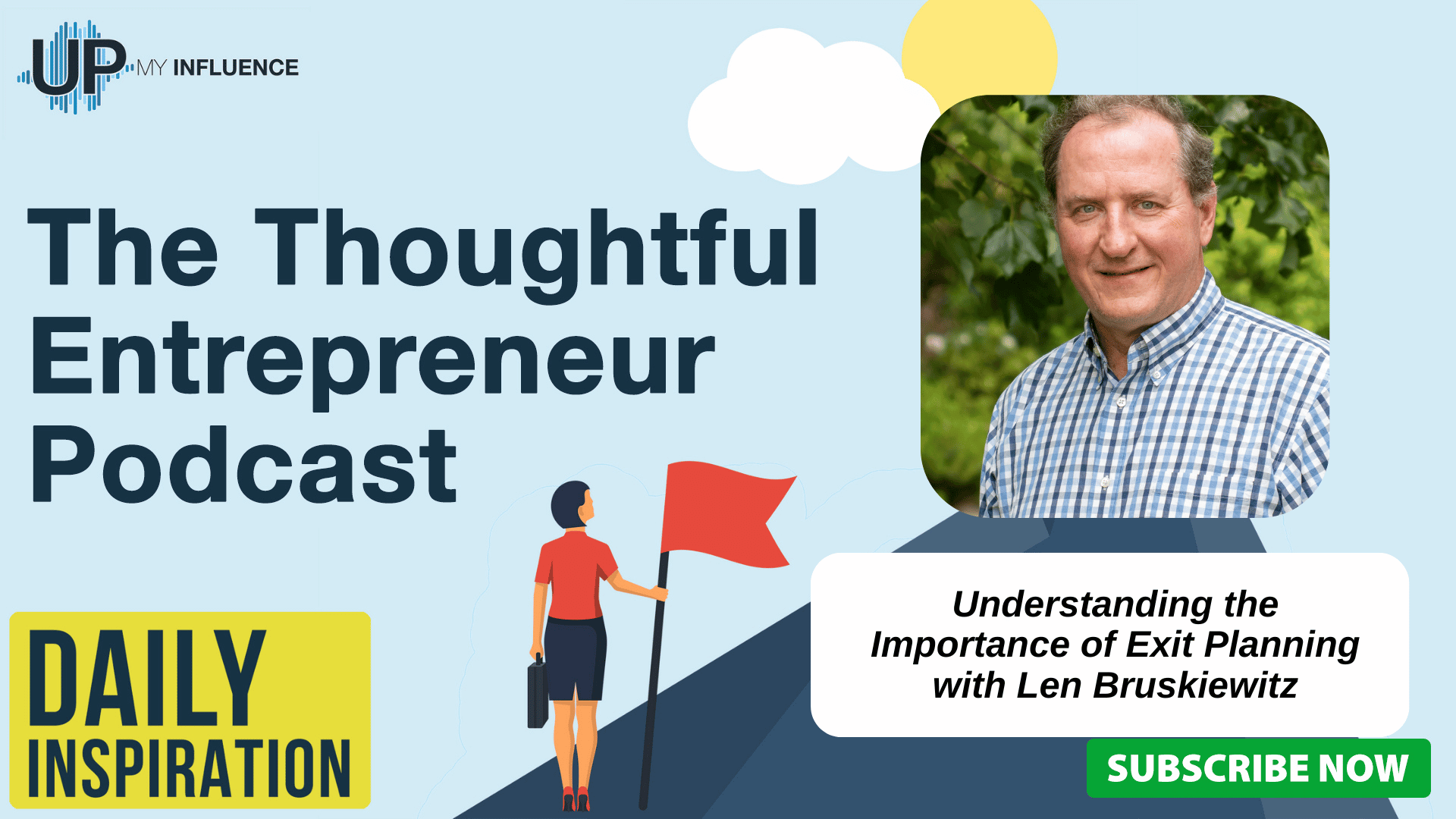THE THOUGHTFUL ENTREPRENEUR PODCAST
 Mastering the Art of Business Exit Planning
Mastering the Art of Business Exit Planning
In a recent episode of the UpMyInfluence podcast, host Josh had an enlightening conversation with Len Bruskiewitz, a certified business and executive coach and certified exit planning advisor. Len specializes in helping business owners, particularly those with revenues between $1 million and $10 million, prepare for a successful transition out of their businesses. This blog post delves into the key themes and actionable advice shared during the episode, providing a comprehensive guide for business owners looking to master the art of exit planning.
One of the most striking statistics shared by Len is that only about 20 to 25% of businesses that go up for sale actually sell. This low success rate underscores the critical need for meticulous exit planning. Len emphasizes that business owners should start thinking about their exit strategy well in advance—ideally, from day one. Key considerations include having a clear post-exit plan, developing a robust growth strategy, maintaining accurate accounting records, and creating distance from the business to make it more attractive to buyers.
Josh and Len also discuss the emotional challenges that many business owners face when planning their exit. For many, their business is a significant part of their identity and purpose. Strategies to address these emotional hurdles include seeking professional guidance, focusing on legacy, and planning for an exciting future post-exit. Len shares examples of both successful and unsuccessful exit plans, highlighting the importance of starting early, improving business operations, and engaging potential successors.
About Len Bruskiewitz:
As a Business Coach & Certified Exit Planning Advisor, he specializes in assisting business owners generating $1-10M in revenue to plan and execute successful transitions of their companies to family members, third parties, or employees, all according to their specific timelines and terms. In the US, over 3 million of the 6 million companies with 1-19 employees are owned by individuals aged 55 and older, with most lacking any form of transition plan. His services provide them with two primary benefits: a substantial reduction in stress and a noteworthy increase in their company's value.
About FocalPoint Coaching:
Focal Point Business Coaching is the world’s premier Coaching and business skills training organization.
We provide business performance coaching and training to business owners and executives. This is accomplished through one-on-one coaching in an environment of continuous learning, positive support and results-driven accountability. Everything is here: Worldwide BRAND, World class CONTENT, A proven SYSTEM, Innovative use of TECHNOLOGY, Unparalleled SUPPORT and an unmatched TEAM of Business Coaches around the world.
We are experts at business growth, showing business leaders how to become more profitable, work less and ultimately, enjoy their lives more.
Focal Point Business Coaching is powered by Brian Tracy. We use Brian's business building tools, systems and methodology and we are an extension of Brian's goal to help business owners and executives achieve greater success.
Apply to be a Guest on The Thoughtful Entrepreneur: https://go.upmyinfluence.com/podcast-guest
Links Mentioned in this Episode:
Want to learn more? Check out Focal Point Business Coaching website at https://focalpointcoaching.com/
Check out Focal Point Business Coaching on LinkedIn at https://www.linkedin.com/company/focalpoint/
Check out Len Bruskiewitz's website at https://lenbruskiewitz.focalpointcoaching.com/
Check out Len Bruskiewitz on LinkedIn at https://www.linkedin.com/in/kevincharlesroy/
Don’t forget to subscribe to The Thoughtful Entrepreneur and thank you for listening. Tune in next time!
More from UpMyInfluence:
We are actively booking guests for our The Thoughtful Entrepreneur. Schedule HERE.
Are you a 6-figure consultant? I’ve got high-level intros for you. Learn more here.
What is your #1 Lead Generation BLOCKER? Take my free quiz here.
Want to learn more about all the podcasts managed by UpMyInfluence? Opt in here.


